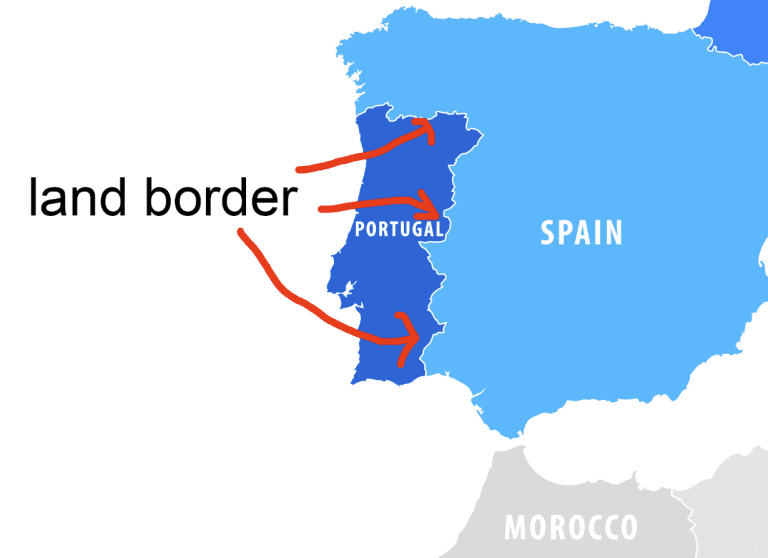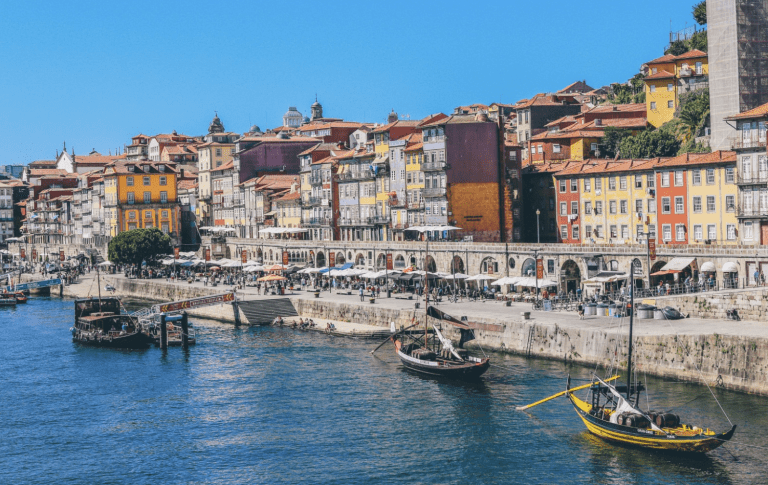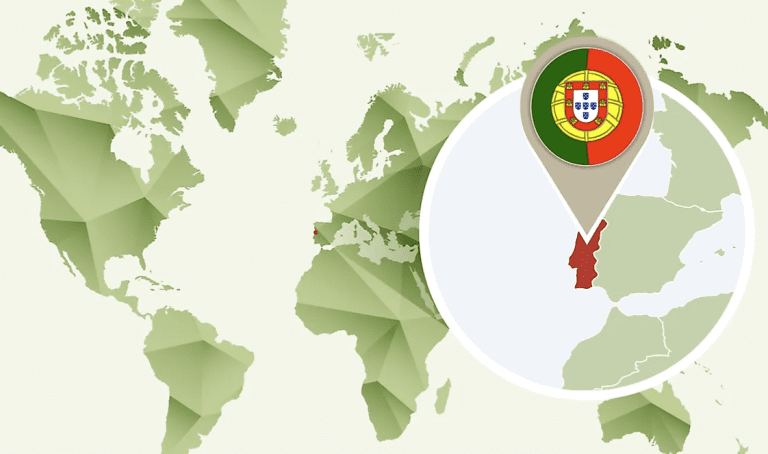What is the expense of residing in Portugal? This question is a common one among those considering relocating to this beautiful Western European country. As we delve into the intricacies of living costs, you’ll find that Portugal offers an appealing blend of affordability and quality of life.
In our exploration, we’ll assess housing costs in Portugal compared to other European countries. We will look at both property prices for buying and renting options, as well as average monthly utility costs. Food pricing also plays a significant role in your budget; hence we’ll explore grocery shopping expenses and how affordable eating out can be.
Transportation within cities like Porto comes with its own set of considerations. You will find affordable taxi fees alongside public transport alternatives which often prove to be the cheapest option. Additionally, understanding how much it costs to live in Portugal extends beyond daily living expenses – education opportunities, healthcare services, social security benefits coverage all factor into the overall picture.
Lastly, while bureaucracy might seem daunting initially, navigating banking challenges can be simplified with some insights. So let’s embark on this journey together!
The Allure of Living in Portugal
Portugal, a Western European country known for its great climate, superb wines, beautiful beaches and vibrant culture is becoming increasingly popular among expats and retirees. Its affordability compared to other countries adds to the allure of living here.
Enjoying the Portuguese Climate
If you’re someone who loves sunny weather with mild winters, then Portugal’s climate will be perfect for you. With over 300 days of sunshine per year on average along the coastline areas like Algarve or Lisbon, it’s no wonder that people are drawn towards this part of Europe.

Immersing in Vibrant Culture
Beyond its attractive climate and affordable cost of living, Portugal boasts a rich cultural heritage that spans centuries. From traditional Fado music echoing through narrow cobblestone streets in Alfama district to contemporary art exhibitions at Calouste Gulbenkian Museum,, there’s always something captivating happening around every corner.
In addition to these cultural experiences, one cannot forget about the mouth-watering cuisine. Known worldwide for their love for food – especially seafood – Portuguese gastronomy offers an array of dishes from Bacalhau à Bras (codfish) to Pasteis de Nata (custard tarts). If you’re a wine lover too? You’ll be spoilt by choice with world-renowned Port Wine or Vinho Verde coming straight from Douro Valley vineyards.
This unique blend makes Portugal not just an economical option but also enriches your life experience making it worth considering as your next home destination.
Affordable Housing Costs in Portugal
Living in Portugal is a desirable prospect for numerous individuals, and not simply because of the nation’s captivating scenery and abundant heritage. The cost of housing in Portugal is a major draw for many, particularly due to its affordability.
Buying vs Renting Property
If you’re considering making Portugal your home, you might find that buying property here can be more economical than renting.
The process of buying a house involves certain fees such as transfer tax (IMT), stamp duty, and legal fees, which should be factored into your budget plan.
Utility Costs Considerations
In addition to housing costs, utilities such as electricity, water and gas may be more expensive in summer months due to higher usage of air conditioning. On average, these utility bills range between 100 – 150 euros per month depending on consumption habits. You can use Numbeo’s cost comparison tool for more information.
You’ll also need internet services, with good broadband packages available at approximately 30 Euros monthly (source). Other expenses include a garbage collection fee that averages around 20 euros annually, while condominium charges, if living in an apartment block, vary widely based on amenities provided but generally lie within the range of 20-50 Euros monthly.
Budget-friendly Food Prices
Living in Portugal can be a great bargain for food shoppers. Your wallet will thank you when you see how far your money goes here compared to other European countries.
Cost-effective Grocery Shopping
In Portugal, you can find high-quality fresh produce at wallet-friendly prices in both markets and supermarkets. Local markets offer a wide variety of fruits, vegetables, fish, and meat at prices that won’t make you cry. If you prefer supermarkets, check out Continente, Pingo Doce, and Lidl for competitive prices on both local and imported goods.
- Fruits & Vegetables: Get your daily dose of vitamins for around a‚1 to 2 euros per kilogram.
- Dairy Products: Milk costs approximately a‚¬0.60 per liter, and cheese ranges from 5-10 euros per kilogram (depending on your cheesy desires).
- Meat & Fish: Chicken is about 4 euros per kilogram, while beef can go up to 10 euros per kilogram. Fresh fish prices vary, but you can expect to pay between 5 and 15 euros per kilogram.
Eating Out on a Budget
For those who don’t enjoy cooking or want to experience Portuguese cuisine without the hassle, dining out is an economical option. You’ll be pleasantly surprised by how affordable restaurant meals can be in Portugal. Multicourse meals often range between USD$32-$39, and that includes wine. Cheers to that.
A typical meal might start with a delicious soup, followed by a main course like grilled sardines or pork Alentejana (a traditional dish made with clams) served with a side of potato salad. And for dessert, don’t miss out on the famous pastel de nata, a mouthwatering custard tart that originated in Lisbon. Wash it all down with a glass of vinho verde, a unique green wine known for its refreshing light taste. All of this for under $40? Now that’s a steal. Check out popular restaurants like O Portugues Restaurant and Cervejaria Ramiro.
Living in Portugal has the advantage of affordable food prices, especially when it comes to fresh produce. Local markets and supermarkets like Continente and Lidl offer a variety of fruits, vegetables, meat, and fish at budget-friendly prices. Eating out is also a great option with multicourse meals ranging from $32-$39 that include wine, allowing you to indulge in authentic Portuguese cuisine without breaking the bank.
Transportation Options within Cities
Commuting in Portugal? No problemo. The country has got you covered with affordable and convenient transportation options.
Taxi Fees Overview
Taxi rides in Portugal are generally inexpensive, so you won’t have to worry about breaking the bank. A typical city ride will cost you around a‚¬5-a‚¬10 ($6-$12). Just watch out for peak hours and bulky luggage fees. For more info on taxi rates, check out this taxi fare estimator for Lisbon.
Public Transport Alternatives
If taxis aren’t your jam or you’re looking to save some serious cash, Portugal’s got a stellar public transportation system. Buses, metros, and trains, oh my.
- Buses: Hop on a bus for as little as €1.50 ($1.80) per trip. Talk about budget-friendly.
- Metro: In bigger cities like Lisbon and Porto, you can ride the metro for around €1.30 ($1.55) per journey.
- Trains: Need to travel between cities? Trains are your best bet, with prices ranging from €10 – €40 ($12 – $48) depending on distance and service type.
If you’re a frequent traveler, consider snagging a monthly pass for unlimited rides. It’s a money-saving game-changer. Check out the official website of Lisbon’s Metro System for ticketing options and route maps. And if you’re in Porto, their Metro System has got you covered too.
Education Opportunities at Reasonable Rates
If you and your family are relocating to Portugal, then making sure that the educational opportunities available for them will be an essential factor. Good news: education in Portugal won’t break the bank.
Basic Education System in Portugal
Portugal offers free basic education for residents. From primary school up to the upper secondary level, inhabitants of Portugal can obtain a comprehensive education without having to pay any fees. Public schools are the way to go, but if you prefer private institutions, they’re still cheaper than other European countries.
Affordable Higher Degrees
Looking for a bachelor’s or master’s degree? Portuguese universities have got you covered. For an affordable quality education, Portuguese universities offer tuition fees from a‚¬950 to a‚¬1,500 annually. Check out Portuguese universities for more information.
Quality Healthcare at Reasonable Cost
where healthcare is top-notch and won’t break the bank. The country offers a mix of public and private services to keep everyone healthy and happy.
Public Vs Private Health Insurance Costs
Want free medical care? Portugal’s public healthcare system, Servico Nacional de Saude (SNS), has got you covered. Just be prepared for some waiting time. Or, if you’re feeling fancy, opt for private health insurance for quicker access and posh facilities.
Private health insurance in Portugal costs around a‚¬400 per year – a small price to pay for peace of mind. Plus, it’s cheaper than other European countries. But hey, if you’re a jetsetter or have unique medical needs, consider international health insurance too.
Remember, cheap coverage might seem tempting, but when serious health issues strike, costs can skyrocket. So, invest in reliable international health insurance and prioritize your well-being. What’s the purpose of economizing if it implies taking a chance with your health?
Social Security Benefits Coverage
Living in Portugal is not just about relishing the great life, but also grasping and managing the functional components of day-to-day living. One such important aspect to consider is social security benefits coverage.
Social security benefits explained
The Portuguese system provides a comprehensive range of social security benefits that support residents in various stages of life. These include coverage for unemployment, occupational diseases, invalidity, maternity, pension, and death.
Unemployed or unable to work? You may be eligible for financial assistance through unemployment or invalidity benefits. New moms can enjoy maternity leave payments, while retirees can look forward to a comfortable retirement with regular pension payouts.
Private insurance options are also available to provide additional coverage based on individual needs. Just remember to carefully assess all options before making a decision. Terms, conditions, and costs vary.
Budgeting For Banking Expenses In Portugal
When planning your budget for living in Portugal, don’t forget about banking expenses. Monthly charges may not appear to be significant initially, yet they can accumulate after some time. Be wise and consider this when setting up your bank account. Check out this helpful guide on banking in Portugal for tips on reducing fees.
Navigating The Bureaucratic Hurdles Of Banking In Portugal
The bureaucratic hurdles in the banking sector can be challenging, especially for expats unfamiliar with local procedures and regulations. Having extra cash and reliable private health insurance can be beneficial. Explore international health insurance options that provide adequate coverage for your personal requirements. It’s all about peace of mind while living in beautiful Portugal.
Bureaucratic Hurdles And Solutions
Portugal is a dream destination for many, offering an affordable cost of living and an exceptional quality of life. However, just like any other nation, it faces certain bureaucratic obstructions that can be quite daunting. One area where this is particularly evident is within the banking sector.
Navigating Banking Challenges In Portugal
In Portugal, most banks charge a monthly fee which should be factored into your overall living expenses. Fees for different accounts and services may vary, but generally range from around $5 to $20 per month. Though these charges may seem minor, if not carefully monitored they can accumulate and become a major portion of your spending plan.
Opening a bank account in Portugal as an expat or digital nomad may be more complex than anticipated due to stringent anti-money laundering regulations, necessitating the need for various documents such as proof of address, identification papers and tax information. You’ll need various documents such as proof of address (which could be difficult if you’ve just moved), identification papers, and tax information among others.
If navigating through these challenges seems daunting, there are resources available online that provide detailed guides on how to open a bank account in Portugal. Additionally, some international banks offer services specifically tailored towards expats which could make things easier for those who prefer dealing with familiar systems.
Despite these challenges, having extra cash at hand along with reliable private health insurance will always prove beneficial when residing in this beautiful country. The slow pace of life combined with excellent internet connections makes it an ideal destination for digital nomads seeking both adventure and comfort while working remotely.
To sum up, while bureaucratic hurdles do exist, they’re far from insurmountable. With careful planning, patience, research, and proper guidance – making Portugal your new home can indeed turn out to be one of the best decisions ever made. So why wait? Start packing your bags today. Happy travels.
Living in Portugal can be affordable and offer a great quality of life, but there are bureaucratic hurdles to navigate, particularly when it comes to banking. Monthly fees for bank accounts should be factored into your budget, and opening an account as an expat or digital nomad may require additional documentation. However, with careful planning and research, these challenges can be overcome to make Portugal your new home.
FAQs in Relation to How Much Does it Cost to Live in Portugal
How much does it cost to live comfortably in Portugal?
The average monthly budget for a comfortable lifestyle in Portugal is around $2,500. This includes housing, utilities, groceries, healthcare, and leisure activities.
Can you live in Portugal on $2000 a month?
Yes, you can. Many expats manage to live comfortably in smaller cities or rural areas of Portugal with a monthly budget of $2,000.
Can you live in Portugal on $1000 a month?
Living on $1,000 per month might be challenging but possible if you lead an extremely frugal lifestyle focusing mainly on basic necessities.
Can I live in Portugal with $1500 a month?
A monthly budget of $1,500 can provide for modest living conditions, including rent for a small apartment outside the city center, along with essential expenses like food and transportation.
Conclusion
Living in High Quality of Life on a Budget!
Portugal offers affordable housing, budget-friendly food, accessible transportation, and reasonable education and healthcare costs.
With careful planning and budgeting, you can enjoy the Portuguese climate and vibrant culture without breaking the bank.







